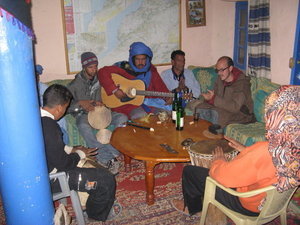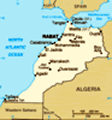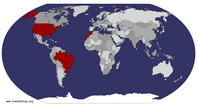Advertisement
Published: November 29th 2008

 music making
music making
recording jam session in merzouga It's the end of November, two days after Thanksgiving. What herein follows is a much delayed and succinct transcription of travels since last updating:
(After arriving in America, I floundered about in the Northwest a bit, before tying my shoes and hitching Eastward to New York City. Here, I ended up living for a year, in BedStuy, Brooklyn, surrounded by a great number of even greater people. In October, I flew to Paris, for a two week crash course in French society. Following the sun, I traveled South, hitching, walking, camping, blessing and cursing across the French and Spanish countryside. In Tarifa, I met with a friend and caught the morning ferry to Tangier. Roughly a month later and perchance wiser, I find myself on the edge of the Sahara...)
Through much trial and error, I've found the jewel of a city in a place called Tata, along the southernmost paved road of Morocco - a mere blink of the eye from the border with Algeria. The path stretches from SW to NW, paralleling the border to the South and the mountain range of the Anti-Atlas to the North. This is the land of the desert, parched days and dry freezing nights, palm oasises, red clay earth mountains and crumbling Kasbahs. It is the land of the Berbers, the inverted -)-(- symbol scrawled and carved onto every possible surface.
Tata is at first appearances a modern city, stunningly clean and bright. The avenues are wide, the stretch of store fronts built to some code that prescribes rose paint and repeating units of Moorish arches. There are an abundance of Internet cafes, a sure sign of any as connectivity with the global world - but alongside, perhaps a donkey hitched to a cart, or a sheep braying from the second floor rooftop. The population is a mere 40,000, and as an emergent sociological phenomena that seems to hold true across cultures, a resultant friendliness and almost entire lack of crime, at least that against a foreigner such as myself.
But one commonality in all Moroccan cities that seems altogether lacking here is the hustler. Let it be said foremost that I am not in the least casting blame, and in a country which such blatant poverty and lack of available work, one could easily champion the creativity which they approach their profession. Typically, the hustler is a guide, store owner - but they can be many things, or anything. Typically an interaction begins like this:
"Bonjour, hola, hello my friend, hey! hey!" "Where do you come from? This is your first time in Morocco? Yes, yes...you go to the Sahara? Here, come here, look at my shop - just look, no buy, sit down, drink some tea." If you have commited to this, there is nothing you can do. Any information you give herein out will be used against you - what hotel you are staying it, what town you are going to. If your new friend does not posess the resources to "make your travel easier," than he has a cousin or a friend. And any information procured will be purposely modified to guide you into the hustler trap.
The notorius Lonely Planet Guidebook warns of scams, including one in which a person "posing as a student invites you to his house." But this needs not be a posture. As my friend Ahmoud from Tazarine explained "When I was a student in Meknes, we used to talk to people travelling, usually couples. We'd pretend to be their friends and buy them wine, hash. We'd travel with them but get money for bringing them to the hotels. We'd take them to shops to buy carpets and get a portion of the carpet. I was a student, how else could I get money?"
I arrive in Tata at night, and step onto the dark street into a teeming crowd of youths. They're pushing about, all shouting into my face. What hustle is this? "Quai!" I shake my hands frantically. I move about evasively, but they keep following me. I grab my baggage from the porter and move to run, before I see them gestring to a luggage push cart. "Ah. Non merci," I leave them laughing and shaking their heads.
My hotel in Tata is a hovel. A closet sized room for 25 dirham a night (the owner begins to offer me only the room at 40 dirhams, but at my slightest hesitation gives me this key). It's above a restaurant where in the morning I get chased out the door with my change as I've overpaid by 3 dirham.
In the early afternoon, I set off on a walk through out of town. After leaving the asphalt, I turn Westward. I find a dry river, the bed of twisted and bulbous calcium deposits that I climb over. A narrow stream of water flows below, and women - most in blue dresses and corollary black headscarves - are gathered about and washing clothes in the trickling water. On the opposite bank lies a grand city of mud. The choice construction for most of the desert is sod - a combination of mud, rock, and straw. The edifices are constructed with an ancient esthetic of turrets and blocked walls. Some may call these kasbahs, the medival structures in which the wealthy families lived to protect themselves during attacks - but it seems moreover to be a typical home structure. With little money and rather cheap construction, it is easier for daughter in laws to move in to the family house rather than out of it. As a result, large houses typically accomadate 10 - 15 people (and sometimes more, as was the case in Oumjerane which boasted a house of 45 people). I wander uncertaintly through the narrow streets, passed by with the most curious of stares and suppressing my slack jawed astonishment and the increasingly bewilderment.
I traverse a large date palm plantation. After two weeks of desert, the green of the desert is an incomprehensible eden. Tall date palms cut the sun into a ribbon of shadows, a jungle, and the mud square terraces are bursting with greenery. Grasses, vegetables, fruit trees of orange and yellow leaves filter the afternoon light as a cacophony of birdsong breathes a life into the peaceful air. Clear water trickles to my side in deep irrigation canals. There are a maze of footpaths through the plantation, every one more beautiful then the next, and I wonder aloud to what place I have stumbled.
But all things come to end, and after 30 minutes of walking, I come out the other end of the plantation, where again the riveted brown rock mountains and the desert is chief. I have seen a town on the hillside and I walk in that general direction, past blighted new construction of concrete and brick and rebar, sticking out like exposed bone. But slowly the new construction gives way to the old, after an impercetible change I find myself climbing the hill into the old town.
Tagonet is built around a mound, a mountain (It is most reminiscent of the Spanish town of Toledo, albeit it in a state of disrepair, probably more accurate to the ancient Toledo in any case). The streets are a jumble of oversized stones, the network of paths a maze, half medina, half fortress, and I duck my head to climb under curved arches - what are really tunnels under houses, the ceilings made up of crossed wooden beams bearing the weight of all the rocks and mud. Many small doors are closed, or boarded up, or fallen in. Many of the houses are no longer houses, and rain and time have conspired to return them to the earth. But the I keep winding upward, over the dusty rocks and the scattered scraps of paper and refuse that litter the path. At some point I meet a band of youths. They are Moroccan, but like most of the people in the south they appear more African than Arab. I try a few words in French, than in Arabic, to no avail, to confused smiles.
In the past week I had spent considerable amount of time in Berber villages. While three major subdivisions of Berber language is spoken in Morocco, there are even more regional variations in words. But in that time, I had been writing down the phonetics of various words and had acquired the most cursory vocabulary. When all else failed, I pointed to the sky - "Ignah!" Then to the house - "Tiderwen!" The sun - "Tahfoit!" The band of youths laugh, enjoying the game, and begin to follow me as I continue down the path, pointing to everything in the path and shouting out the word in Tashelheit, then awaiting my reply (and subsequent amusing mispronounciation). As we get to the edge of town, the children are showing me the frogs in the tiny canal (and teaching me the song about the frogs in the tiny canal), a man approaches who speaks a little French, and he invites me for a walk around the town.
Ben Hussn is a tall thin man in his late thirties. He barely speaks French, but he speaks better than I do - which really leaves us in no better situation. He leads me to the top of the hill, to the cemetery. As all countryside cemeteries, the ground is merely marked by a seemingly random placed stones, maybe a foot tall. What is notably here is the giant white Masoleum on the center of the hill. Hssn explains, as I peer through the window at the covered tomb inside - that this is the tomb of a revered Muslim saint, also that of his grandfather.
We trod back down the hill, and we come to his home. His mother comes to the door, dressed in black, her hands dyed red in henna. She steps out as we enter, and he leads me to a square open courtyard, throwing down some blankets and pillows to sit and drink tea. Our conversation is laboured, but for the most Ben Hssn expresses his indignation at the state of affairs of Morocco, of the poverty and suffering here. He works for the government five hours per day, recieving the pittance of 40 dirham for a days work. Lean and gaunt faced, Hssn's features betray his demeanor at times, and he apologizes profusely when he ventures too far into stories of misery. "Maybe some music instead," he says, and picks up his banjo. Although a banjo of six strings, it has only four, and one string has been fused together with the parts of two or three, and a homemade capo is barred at the fifth fret. He plays Berber music, and plays a few songs, whether his or of the group "Archach," that constitute much of his collection of cassette. He uses a pick of cardboard, and complains that my plastic pick is "too hard." Hssn also has a hage-hooz, the banjo of the Gnawa, a three stringed instrument - but he has no strings. After giving me a homemade Fez, he tries to give me the hage-hooz as well as a present, but I have to refuse (along with other gifts, after showing me his photo album, including a rare black and white photo of his father who left for France in the 1970's and died in France, possibly from alcohol, he leaves me with a more recent picture of himself, scribbling his address on the back).
As his mother's return, we leave the house and he walks with me down through the shadowed tunnels of the city and out into the late day sunlight. We cross the dry river bed, and Hssn leaves me at the road, pointing me in the direction of town. "Shukran, Saalam ah lakum!"
With the sun setting, I walk back admist the palms and the dirt road, the dusty children kicking around the soccer balls, the old men walking in cloaks and the schoolgirls in black headscarves, me in my jellaba and red Fez. The mountains turn orange with the sunset, and the sky ignites in a vibrant blue with the last breathe of the day, like the cloaks of the old women that pass by, fluttering in the wind.
(music of Ben Hssn and explanation)
(sounds from date plantation)
...
Also:
my friend Mae whom I traveled with for sometime here in Morocco has posted her account of our travels as well as photos here.
photos, as always, on flickr
and, this particular effort of my travel is music, and recording music. my recordings from Morocco and Europe.
Advertisement
Tot: 0.113s; Tpl: 0.012s; cc: 12; qc: 49; dbt: 0.0564s; 1; m:domysql w:travelblog (10.17.0.13); sld: 2;
; mem: 1.2mb









Jena
Jena Hazlerigs
It's so good to hear from you!
As always, I enjoy your stories and courage to see this world we have been given to explore! Please never stop writing! (And try to get published, please!) http://farm4.static.flickr.com/3153/3069227778_1dce7b36a5.jpg Fantastic picture!